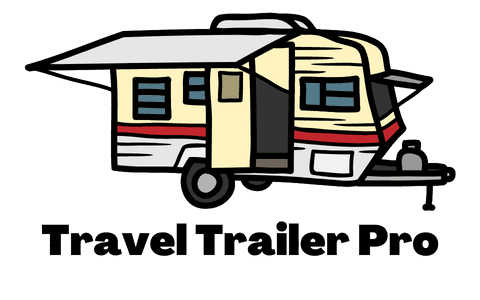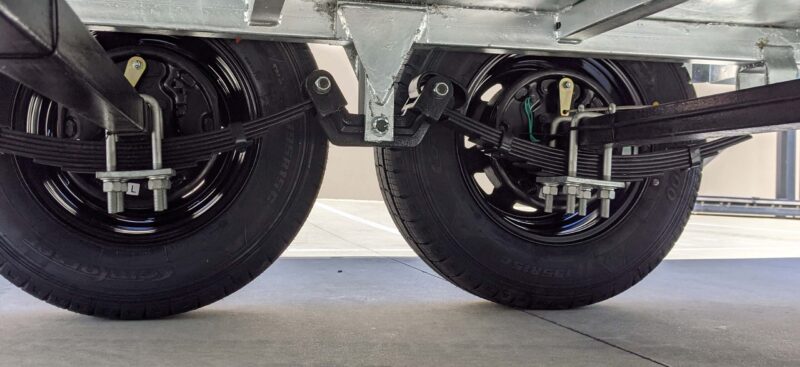This past summer, Susan and I visited Colorado in May and June! We had an absolute blast, but we also learned quite a bit about what it’s like to tow a vehicle through the highest peaks of the Rocky Mountains. So, we thought we would share some of our best tips for RV towing on Steep Grades.
Navigating through steep inclines and sharp descents may seem intimidating at first glance. However, armed with the proper knowledge and practical tips, these challenges become another part of the trip that you can handle with grace and assurance.
This guide equips you with tips for towing on steep grades so you can handle these situations effectively.
We break down the process into easy-to-understand steps and provide helpful advice you can apply in real-life scenarios.
What Is Considered A Steep Grade On Highways?
You might be curious about the specifics of steep grades on highways.
What exactly constitutes a “steep” grade?
How does it impact your journey while towing an RV?
On federal highways, signs are typically posted for any incline or descent with a 5 percent grade or more. This means for every 100 feet you travel horizontally, the elevation changes by 5 feet.
But remember, steepness is only part of the story.
The length of the highway stretch over which the grade extends also plays a crucial role. A small grade that continues over a long distance can put as much strain on your brakes as a short, steep grade.
This combination of grade and length determines the overall difficulty of tackling a particular stretch of highway.
Being aware of these factors can make your journey safer and more manageable.
What Do Road Grades Mean?

Road grades refer to the level of steepness or incline of a roadway. It measures how much the road rises or falls over a certain distance.
The grade is typically calculated over a 100-foot distance and expressed as a percentage.
For example, if you come across a sign that says 10% grade, it indicates a change in elevation of 10 feet for every 100 feet of road. This means the road either ascends or descends 10 feet every 100 feet.
This doesn’t seem very steep when you think of it as 10 feet for every 100 feet but trust me, it looks formidable when looking through your front windshield.
Understanding road grades can help RVers anticipate the road ahead and drive more safely.
Tips For RV Towing On Steep Grades
Driving on a steep road can be challenging, but towing on one is a different ball game.
It requires a good understanding of your vehicle’s capabilities and some preparation to ensure a safe and smooth journey.
Here are some valuable tips to help you tackle steep grades confidently while towing.
1. Understand Your Vehicle’s Towing Capacity
When embarking on a journey that involves traversing steep grades, it is imperative to have a comprehensive understanding of your vehicle’s towing capacity.
Being aware of this crucial detail will enable you to make informed decisions and ensure the safety of your vehicle, passengers, and cargo.
Overloading your vehicle beyond its prescribed limits can have detrimental consequences, such as diminished control and the risk of potential damage.
Therefore, it is always advisable to meticulously assess and adhere to your vehicle’s towing capacity to guarantee a smooth and secure journey.
If you have seen any of our articles or responses to questions in our YouTube comments, then you know we always recommend the 80% rule. This means never towing more than 80% of your vehicle’s towing capacity.
For example, if your vehicle can tow 10,00o lbs we recommend you don’t tow more than 8,000 lbs GVWR of trailer with your vehicle. The 8,000 lbs includes the trailer and all your supplies and gear. This will keep you safe and won’t wear out your tow vehicle on steep road conditions.
2. Check Your Trailer Connections
Before hitting the road, conducting a thorough inspection of your trailer or (in our case, our toad vehicle) is essential.
Here are some key points to include in your inspection:
- Hitch Inspection: The hitch is a critical component that connects your vehicle to the trailer. Ensure it’s securely attached and shows no damage or wear.
- Safety Chains Check: These chains provide an extra layer of safety, preventing the trailer from completely detaching if the hitch fails. You should correctly fasten them and ensure they are free from rust.
- Wiring Examination: The wiring system connects the lights and brakes of your trailer to your vehicle. Look for any signs of damage or wear, such as frayed wires or loose connections, which could cause issues on the road.
- Breakaway Cable Verification: The breakaway cable is a vital safety feature that applies to the trailer’s brakes if it detaches from the towing vehicle. Ensure it’s in good condition and properly connected.
Additional points to consider during your inspection:
- Tire Check: Like your car, your trailer’s tires must be in good condition. Check for proper inflation, tread depth, and any signs of damage or wear.
- Brake Inspection: Test the brakes before setting them off and adjust them as necessary.
- Light Test: Check all lights on the trailer, including brake lights, turn signals, and running lights. Replace any burnt-out bulbs and repair any faults before heading out.
- Load Distribution: Make sure your load is evenly distributed within the trailer. An unbalanced load can affect handling and increase the chance of a rollover.
When everything is connected correctly and functioning as it should, it will significantly reduce the risk of accidents.
It’s always better to be safe than sorry when towing your trailer, so invest the extra time and effort to give yourself peace of mind during your travels.
3. Set Your Trailer Brakes Correctly
It is crucial to ensure your trailer brakes are set correctly when RV towing on steep grades.
One important aspect is adjusting the brake controller so the trailer brakes engage just before the vehicle brakes.
This allows for better control of the trailer and helps prevent it from exerting excessive force on your vehicle during downhill descents.
By correctly utilizing the trailer brake, you can significantly enhance the safety and stability of your towing experience in challenging terrains.
4. Use Engine Braking
Engine braking is an advantageous technique that can be employed by drivers. Utilizing the engine’s resistance alongside the brakes instead of solely relying on the braking system.
This method becomes particularly advantageous when driving downhill, as it effectively mitigates the risk of brake overheating and significantly reduces the potential of brake failure, ensuring a safer and more controlled descent.
Diesel trucks are particularly well known for their engine braking. However, downshifting in a gas vehicle can assist with braking as well. Getting a feel for your tow vehicle and combining downshifting with braking so that your brakes or transmission aren’t overworked will take some practice.
When you find the balance it will make towing down steep grades feel more controlled and be less stressful on your tow vehicle.
5. Plan Your Route
Before embarking on your journey, it is always a good idea to meticulously plan your route.
Take the time to assess the terrain carefully, paying particular attention to any steep grades or inclines you may encounter.
With this foresight, you can adequately prepare yourself and your vehicle, adjusting your speed and gear selections to ensure a safe and smooth journey.
Remember, the key to a successful trip lies in the details of your preparation.
Can Camper Trailer Brakes Fail?
As you prepare for your next RV adventure, it’s essential to remember that safety comes first. One crucial aspect of this is understanding your camper trailer’s brake system.
You may wonder, “Can camper trailer brakes fail?”
While it’s possible, it’s not a common occurrence.
Camper trailer brake setups are straightforward and designed to be reliable. When they’re well-maintained they rarely cause much trouble. However, like any mechanical system, they’re not immune to failure.
The key to avoiding any issues lies in proper maintenance.
Regularly servicing your brakes and addressing any minor issues promptly can significantly reduce the risk of unexpected failures.
And, of course, using high-quality components and having them installed by professionals can make a world of difference.
It’s always a good idea to perform brake checks before each trip. By conducting this routine check, you can catch potential problems early and prevent them from escalating.
How Often Do Trailer Brakes Need To Be Replaced?

Braking systems in trailers are pivotal for safety on the road. But just like any other part of your RV, they need regular maintenance and replacement.
There’s no one-size-fits-all answer to this question because several factors come into play.
A common rule of thumb suggests replacing your trailer brakes every 12,000 miles or every two years.
However, this timeframe can vary based on how frequently you use your RV and the level of care and maintenance you provide. RV towing on steep grades can wear trailer brakes faster and should also be taken into consideration.
For instance, if you’re a full-time RVer covering many miles yearly, your brakes may require attention sooner than someone who uses their RV sporadically for weekend trips.
Similarly, consistently maintaining your brakes can extend their lifespan, while neglect can lead to premature wear and tear.
Remember, it’s crucial to monitor your brakes. At the first sign of damage or excessive wear, it’s time to consider a replacement.
Regular adjustments, which should occur approximately every 3,000 miles or as needed, can also ensure your brakes remain in top shape.
The good news is that you can replace most electric trailer brakes affordably.
Plus, with some know-how and the right tools, many RVers can handle the job themselves. So, there’s no reason to put off this important task.
Final Thoughts About RV Towing On Steep Grades
Traveling with a trailer on steep terrains is an experience that can be as rewarding as it is challenging. It’s an opportunity to test your driving skills, appreciate your vehicle’s power, and relish the landscape’s beauty.
However, it’s crucial to remember that safety should always be your top priority. Understanding your vehicle’s towing capacity is the first step to ensuring a safe journey.
Overloading your trailer can lead to difficulty controlling your vehicle, especially when driving up or downhill. Therefore, knowing your vehicle’s limits and sticking to them is essential.
Before you begin your journey, checking your trailer connections is a must. This includes the hitch, safety chains, wiring, and breakaway cable. Ensuring you securely connect everything can help prevent accidents and give you peace of mind during your travels.
Another critical factor is having your trailer brakes set correctly. You should adjust the brake controller to apply the trailer brakes just before the vehicle’s brakes.
Using the trailer brake controller can help control the trailer and prevent it from pushing your vehicle on downhill descents.
Using engine braking and downshifting can also be beneficial, particularly when traveling downhill.
By using your vehicle’s engine and transmission you can slow down and rely less on your brakes, preventing your brakes from overheating and reducing the risk of failure.
Planning your route can also prove helpful.
Knowing what lies ahead allows you to adjust your speed and gear selections appropriately, making for a safer journey.
While RV towing on steep grades can be tricky, with careful planning, regular maintenance, and safe driving practices, it can also be an enjoyable and rewarding experience.
Related Reading:
– Is A Dually Truck Better For Towing An RV?
– Why You Must Understand Tongue Weight When Towing
– Are Camper Trailer Brakes Required By Law?
– Can You Use Truck Tires On A Travel Trailer?
About the Author:
Mike Scarpignato is an avid RVer who owns a Class C RV and a Class A RV. He loves to travel with his wife Susan and write blog articles about the RV lifestyle.
Mike and Susan also make YouTube videos on the RVBlogger YouTube channel.




